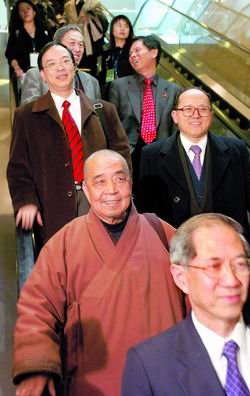
The Hong Kong delegation arrives in Beijing yesterday to
attend the third session of the 10th National Committee of the Chinese People's
Political Consultative Conference. The session starts today and ends on March
12. (Photo: Xinhua)
China's top advisory body will meet from today for an annual session in
Beijing, giving the floor to its more than 2,000 members to voice their opinions
on the country's reform and development, a spokesperson said yesterday.
The third session of the 10th National Committee of the Chinese People's
Political Consultative Conference will begin in the Great Hall of the People
this afternoon and last until the afternoon of March 12, Wu Jianmin, the
session's spokesman, said at a press briefing yesterday.
Jia Qinglin, chairman of the 10th CPPCC National Committee, will deliver a
report on the work of the National Committee's Standing Committee over the past
year, while Zhang Huaixi, a vice chairperson of the National Committee, will
brief members on how their suggestions and proposals were handled throughout the
past year, said Wu.
The CPPCC members, coming from around the country, will also participate in
the third annual session of the 10th National People's Congress, China's top
legislature, as non-voting observers.
They will discuss the draft anti-secession law the NPC will put before
lawmakers for adoption during the legislature's annual session, which runs
almost parallel to the CPPCC session.
Wu said the anti-secession law aims partially at curbing secessionist
activities conducted by the forces for "Taiwan independence" and will greatly
help promote cross-strait relations.
He made the remarks while answering questions raised by a Taiwan journalist.
"Everybody longs for peace and stability but activities of the forces for
'Taiwan independence' threaten regional peace and stability," said Wu.
He also quoted remarks made by Jia on January 28 to commemorate the 10th
anniversary of Jiang Zemin's speech on Taiwan issues made on January 30, 1995.
According to Jia, the anti-secession law will help promote the development of
cross-strait relations and peaceful reunification, maintain China's sovereignty
and territorial integrity, oppose and curb any secessionist activities as well
as maintain peace and stability in the Taiwan Strait.
"It is a law in compliance with the fundamental interests of the Chinese
nation on the whole," Jia noted.
"Chairman Jia's remarks clearly represented the CPPCC National Committee's
views on the anti-secession law, of which the legislation procedure has been set
in motion," said Wu.
Fears that the law will damage cross-strait relations were "groundless," the
spokesman said.
Wu also hailed the move to have more Hong Kong representatives in this
central government think tank. "To have more personages from Hong Kong in the
CPPCC National Committee is very conducive to the strengthening of
communications between the Hong Kong Special Administrative Region and the
central government," he said in reply to a reporter.
Asked whether the CPPCC National Committee will undergo any major personnel
changes, Wu said any such change must go through democratic procedures, and
therefore it can't be predicted before the formal start of the session.
The CPPCC National Committee recently decided to induct 80 new members,
including nine from Hong Kong and two from Macau.
Wu said domestic and foreign journalists are welcome to cover the CPPCC
session's opening and closing meetings, as well as the special "speech sessions"
at which advisers will speak on major social problems. Journalists are also
invited to attend a number of open-door panel discussions of the CPPCC members.
Two press conferences will be held during the session.



